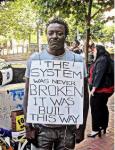 One question I’m frequently asked is what “social movement teacher unionism” looks like and how to get there. The first place people are looking, and correctly so, is the Chicago Teachers Union, transformed by radical activists who learned from failed reform efforts and began to build the union at the school, rather than mostly concentrating their efforts at capturing the union apparatus as had been done previously.
One question I’m frequently asked is what “social movement teacher unionism” looks like and how to get there. The first place people are looking, and correctly so, is the Chicago Teachers Union, transformed by radical activists who learned from failed reform efforts and began to build the union at the school, rather than mostly concentrating their efforts at capturing the union apparatus as had been done previously.
CORE’s success was based in part on Chicago’s unique circumstances that don’t exist elsewhere. They have much to teach teachers elsewhere and at the same time, their success can’t be reduced to a formula. We have much to learn (and share) from how this new movement is evolving elsewhere. For instance, activists in NYC and Newark NJ (whose organizing almost yielded them a majority of the union leadership positions in the most recent election) shared insights in this panel about their vision of a democratized union, one that works with parents and students, and how they are working towards it. I’m still bowled over by the specifics they provide.
In Los Angeles, I’m looking to the success of the “Union Power” slate because of its excellent program and work in mobilizing members. I encourage UTLA members to become active in its campaigns. What I think we’ve learned from the LA teachers union in the past years of reform efforts is that no matter how intelligent, conscientious or militant individual leaders are, their capacity doesn’t substitute for building a movement. No leader can do it for us. Real change in our unions, in UTLA and the LA school system, depends on organizing at the school, member by member, building a union presence based on a set of principles and respectful alliances with parents and community. “Union power” isn’t about endorsements for an election but rather building a social movement that holds its leaders’ feet to the fire and at the same time shows up to support projects the union officers put forward.
Elsewhere in the AFT, reform movements are percolating in Providence RI and Philly. In both places, AFT members who understand that the union must attend to the historic injustices of a segregated school system and name racism as a systemic problem are seeing that they have to engage teachers about the lack of democracy in their union and its sclerotic operations. Things are hopping in the NEA as well, in North Carolina, Seattle, and Portland. Next week I’ll offer some thoughts on how the AFT and NEA differ and what this means for organizing.
I invite reader responses, either to New Politics as a blog or to me directly at drweinerlo@gmail.com. Is there a subject you want me to tackle? Let me know. And you can follow my thoughts on teaching, schools, and education on twitter, Facebook, as well as my blog here at New Politics.


What is social movement What is social movement teacher unionism? Does CORE’s success in the Chicago Teachers’ Union qualify as a model? If it’s prioritizing grass-roots organizing in the workplaces over winning votes in delegates’ meetings, CORE did that for nearly our first two years, exposing administration lies and fighting the school closings alongside local school parents-students-administrators while the union leaders did nothing besides talk. As an organizing committee, we gathered teachers to “act like we are the union”. But, after winning the 2010 CTU election, our CORE leaders mainly followed traditional union practices by: * filing lawsuits over procedures when CPS laid off 1,200 in June, 2010 while never trying to mobilize them, other teachers and allies, * backing down in the AFT’s 2010 national convention- persuading delegates to drop their resolution challenging the AFT’s backing RTTT legislation- laws that undermined seniority and job-security by mandating student “achievement” for teacher evaluations, et.al. * choosing secret negotiations with corporate “stakeholders” ( Jan.-May, 2011) over informing/mobilizing teachers and allies when faced with draconian legislation known as SB7- a law that ended seniority in economic layoffs/rehires statewide, et.al, * endorsing and contributing to political enemies ( Oct. 2012) masquerading as “friends of labor”, such as (Dem- Chicago)House Speaker Madigan who set up the SB7 deal and who rammmed through a 5-year moratorium on government pension payments. Lois Weiner rightly posits the need for a radical caucus ” building a social movement that holds its leaders’ feet to the fire…” Yet CORE has not done that; au contraire. For example, CORE members voted to endorse the secret negotiations for SB7, defeating a motion that CORE campaign to defend seniority and quality education in the schools, in the union, and with teacher-union allies under threat across the state. Contributing to this, CTU staff were forced to sign agreements not to even discuss “union business” outside union bodies, thus effectively muzzling open discussion, even in CORE meetings. How do educators and allies confront the corporate-capitalist education agenda- from Bush’s NCLB testing mania to Obama’s RTTT test-based evaluations to ‘merit pay’ to gutting seniority? Is the answer in teacher-parent-student alliances on education issues? Or, is the corporate education agenda part of a larger class war on the wider working class? If so, let’s make that the basis for social unionism. Such a perspective enables us to stand for quality education for all as part of a real social movement- one that can hope to actually rally power to fight the ongoing class warfare against our jobs, pensions, health care, seen in continuing racism, global militarism, deadly ecocide and more. We need a working-class resistance, not traditional politics with militant tactics. CORE member from Aug. 2008-Oct. 2011. Contact me at: red1pearl@aol.com